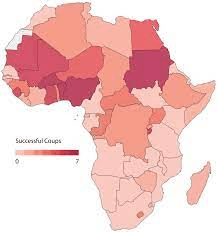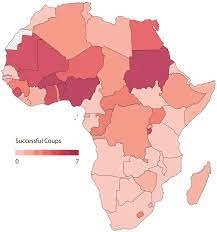The Coup in Niger Republic is intolerable, but its Implications are far reaching

Amidst increasing political turmoil in West Africa, the recent coup that overthrew the president of Niger Republic has raised significant concerns about the potential danger of a regional war. This article delves into the aftermath of the coup and explores the broader implications it carries for the stability and security of the region. By examining the historical context of political unrest in West Africa and analyzing the regional impact, economic consequences, humanitarian crisis, and international response, we aim to shed light on the potential risks and challenges that may arise from this critical situation. Additionally, this article will discuss strategies for conflict resolution and the urgent need for regional cooperation and stability in order to prevent the escalation of tensions into a full-scale regional war.
Thank you for reading this post, don't forget to subscribe!1. Introduction: The Coup in Niger Republic and its Implications
1.1 Background of the Coup
Cue the dramatic music because West Africa is once again making headlines with another coup. This time, it’s the Niger Republic that’s experiencing political turmoil. On 26 July 2023, a group of military officials overthrew the democratically elected president, Mohamed Bazoum, citing concerns over his alleged corruption and inability to address the country’s security challenges. While coups may seem like a blast from the past, they continue to occur, bringing uncertainty and potential for conflict.
1.2 Initial Reactions and International Concerns
As news of the coup broke, the international community collectively sighed, “Here we go again.” Many countries expressed their concerns over the situation in Niger Republic, fearing a potential power vacuum and the implications it could have for regional stability. The African Union, in particular, emphasized the need for a peaceful and constitutional transfer of power, urging the military to swiftly restore civilian rule. The world holds its breath, hoping for a resolution that avoids further chaos in a region already grappling with political unrest. But things are changing, as Chiefs of Armies of the West African nations meet. The coup planners are reported to be flying their families to Dubai and other neutral countries. The tension escalates.

2. Historical Context: Political Unrest in West Africa
2.1 Political Instability in the Region
Ah, West Africa, where political stability feels more elusive than finding a unicorn in a haystack. This region has a long history of political unrest, with coups becoming an unfortunate recurring trend. From Mali to Burkina Faso, it seems like the recipe for governance in West Africa is one part democracy, two parts discontent, and a sprinkle of military intervention. The Niger Republic coup is not an isolated incident but rather part of a larger pattern of instability in the region.
2.2 Previous Coups and their Consequences
Let’s take a trip down memory lane, shall we? In recent years, West Africa has seen its fair share of coups, each leaving scars that take time to heal. Remember Mali’s military coup in 2012? It plunged the country into chaos, leading to a separatist rebellion, a jihadist insurgency, and a whole lot of headaches for everyone involved. And who could forget Guinea-Bissau’s constant coup carousel that has hindered its development and stability? These previous coups serve as cautionary tales, showing the potential consequences of political unrest and power struggles.
3. Regional Impact: Escalation of Tensions and Potential for Conflict
3.1 Spillover Effects on Neighboring Countries
Like a domino effect, a coup in one country has a knack for impacting its neighbors. In the case of Niger Republic, neighboring countries such as Nigeria, Burkina Faso, and Mali are closely watching the situation unfold. The fear is that the unrest in Niger Republic could spill over into these already fragile states, exacerbating existing conflicts and potentially igniting new ones. It’s like a game of political Jenga, except the consequences are far more severe.
3.2 The Risk of Proxy Warfare
Okay, brace yourself because things could get messy. When political instability and regional tensions mix, it’s a recipe for proxy warfare. Various actors with vested interests in the region might see this power vacuum as an opportunity to further their own agendas. Whether it’s rebel groups, militant organizations, or international powers, everyone loves a good game of chess with West Africa as the board. The risk of proxy warfare adds another layer of complexity to an already volatile situation.
4. Economic Consequences: Threats to Stability and Development
4.1 Disruption of Trade and Investments
A coup can be a real mood killer for economic stability. When political uncertainty reigns, trade and investments tend to take a nosedive. Businesses become hesitant to operate, foreign investors flee like they’re being chased by a swarm of angry bees, and the economy is left gasping for stability. With West Africa already grappling with economic challenges, the coup in Niger Republic poses a threat to regional trade and investment, potentially derailing development efforts. Across the boundary from Nigeria, as the coup plotters in Niger have severed economic ties, traders and their hundreds of trucks, with mostly perishable agricultural goods, are becoming more frustrated as the weeks pass by. Almost a hundred billion Naira worth of informal and untaxed international trade exposed.
4.2 Impacts on Regional Economic Integration
Oh, regional economic integration, our dear friend. The coup in Niger Republic casts a shadow of uncertainty over the progress made in regional economic integration efforts. Organizations such as the Economic Community of West African States (ECOWAS) and the African Continental Free Trade Area (AfCFTA) have been working tirelessly to promote economic cooperation and integration. However, a coup can throw a wrench in the plans, making it harder for countries to work together towards a shared economic future.
In conclusion, the coup in Niger Republic serves as a stark reminder of the persistent challenges faced by West Africa in its quest for political stability and economic development. The potential for a regional war looms, as tensions escalate and external actors eye the situation with their own interests in mind. As the region collectively holds its breath, hoping for a peaceful resolution, it is clear that the consequences of this coup extend far beyond the borders of Niger Republic.
5. Humanitarian Crisis: Displacement and Vulnerable Populations
War has a devastating impact on civilian populations, and the recent coup in Niger Republic has already resulted in forced displacement and an increase in vulnerable populations.
5.1 Forced Displacement and Refugee Flows
As conflict escalates, people are forced to flee their homes, seeking safety and shelter elsewhere. This coup has triggered a wave of forced displacement in Niger Republic and the surrounding regions. Families are torn apart, livelihoods disrupted, and communities uprooted from their homes. The displacement crisis is not limited to Niger Republic alone. There will also be a significant flow of refugees into neighboring countries, further straining limited resources and infrastructure.
5.2 Humanitarian Needs and Response
The humanitarian needs resulting from the coup and subsequent conflict are immense. Displaced populations and refugees require access to food, clean water, healthcare, and shelter. Women, children, and the elderly are particularly vulnerable in these situations, facing increased risk of exploitation, abuse, and neglect. Humanitarian organizations are working tirelessly to provide assistance and alleviate suffering, but the scale of the crisis requires international support and solidarity.
6. International Response: Diplomatic Efforts to Mitigate Conflict
In the face of this regional crisis, diplomatic efforts are crucial to prevent further escalation and promote stability.
6.1 Role of Regional Organizations
Regional organizations such as the Economic Community of West African States (ECOWAS) and the African Union (AU) should play a vital role in addressing the conflict. These organizations have the mandate and influence to engage with stakeholders, mediate disputes, and coordinate efforts to restore peace. Their involvement is instrumental in ensuring a collective and cohesive response to the crisis.
It appears the war in Russia and Ukraine, is not only affecting the cost of b,

It appears the war in Russia and Ukraine, is not only affecting the cost of bread consumed by African households, the need for uranium, and its supply by Russia, or alternatively by Niger Republic highly blessed with Uranium, has become a chess game, to which Africa has been lured to be involved in. However, the need to stamp out frequent coups in Africa, can not be over-emphasized. Thus there must be a balance of approaches and strategies
6.2 Mediation and Negotiation Initiatives
Attempts at mediation and negotiation should be pursued to mitigate the conflict. Diplomatic channels, backed by regional and international actors, can facilitate dialogue between different factions and work towards finding a peaceful resolution. This requires the commitment of all parties involved to prioritize the well-being and stability of the region over personal or political interests.
7. Strategies for Conflict Resolution and Peace building
Resolving the conflict and building lasting peace in the region requires addressing the root causes of unrest and rebuilding trust.
7.1 Addressing Root Causes of Unrest
It is essential to identify and address the underlying issues that led to the coup and subsequent conflict. This includes addressing political grievances, socio-economic disparities, and ethnic tensions. By tackling these root causes, there is a greater chance of establishing a stable and inclusive society that can safeguard against future upheaval.
7.2 Rebuilding Institutions and Trust
Rebuilding institutions and restoring trust among the population are integral to creating a sustainable peace. This involves establishing transparent and accountable governance structures, promoting the rule of law, and ensuring equitable access to resources and opportunities for all. Reconciliation efforts, truth and justice mechanisms, and economic development programs are vital components of the rebuilding process.
8. Conclusion: The Urgent Need for Regional Cooperation and Stability
The recent coup in Niger Republic has triggered a potential regional war, leading to a humanitarian crisis, displacement, and vulnerable populations. Addressing the conflict requires a comprehensive approach that involves diplomatic efforts, mediation, and addressing root causes. Regional organizations and international actors must work together to promote stability, rebuild institutions, and foster regional cooperation. The urgent need for collective action cannot be overstated, as the future of West Africa hangs in the balance. Through concerted efforts, there is hope for a brighter and more secure future for the region and its people.
8. Conclusion: The Urgent Need for Regional Cooperation and Stability
In conclusion, the coup in Niger Republic has unveiled the grave potential for a regional war in West Africa. It is crucial for all stakeholders to recognize the immediate need for regional cooperation and stability to prevent further escalation of tensions and mitigate the profound consequences that could arise. The international community must support diplomatic efforts and mediation initiatives to foster dialogue, address the root causes of unrest, and rebuild institutions in order to restore peace and security in the region. By prioritizing conflict resolution and peacebuilding, West Africa can lay the foundation for a more stable and prosperous future for its nations and people.
FAQ
1. What led to the coup in Niger Republic?
The coup in Niger Republic was primarily driven by political discontent, allegations of corruption, and dissatisfaction with the government’s handling of various issues, including economic challenges and security concerns.
2. How could the coup in Niger Republic potentially lead to a regional war?
The coup has the potential to escalate tensions and trigger a spillover effect, exacerbating existing political instability in West Africa. This could lead to increased hostilities, proxy warfare, and the involvement of neighboring countries, which may ultimately result in a regional war.
3. What are the economic consequences of the coup?
The coup poses significant threats to stability and development in the region. Disruption of trade and investments, as well as impacts on regional economic integration, could hinder economic growth and exacerbate socio-economic challenges faced by the countries in West Africa.
4. What can be done to prevent a regional war and ensure stability?
Preventing a regional war requires urgent regional cooperation and stability. This involves engaging in dialogue, addressing root causes of unrest, rebuilding institutions, and fostering trust among nations. Additionally, the international community plays a vital role in supporting diplomatic efforts, mediation initiatives, and providing humanitarian assistance to mitigate the risks and pave the way for sustainable peace in West Africa.


